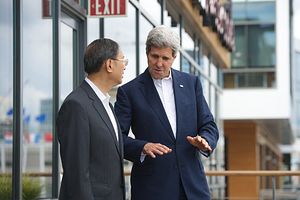Following persistent U.S. lobbying, a number of major Asian nations will not sign on as founding members to China’s new Asian Infrastructure Investment Bank (AIIB).
On Friday, China will hold a signing ceremony to officially establish the AIIB, which many see as Beijing’s counterweight to the World Bank and Asian Development Bank. Those institutions are traditionally dominated by the United States and Japan respectively.
According to the Financial Times, a number of major countries in the region — including Australia, South Korea and Indonesia — have elected to not sign onto the bank when it is launched on Friday. The report also said that no European countries will join at this time. Besides China, the initial signatories to the AIIB on Friday will be Mongolia, Uzbekistan, Kazakhstan, Sri Lanka, Pakistan, Nepal, Bangladesh, Oman, Kuwait, Qatar, India and every member of the Association of Southeast Asian Nations (ASEAN) with the exception of Indonesia, according to the Financial Times report. Of these countries, only India is considered a major nation, and it is likely to become the second biggest stakeholder in the AIIB after China.
China has been quietly lobbying countries throughout the region and Europe to sign onto the proposed AIIB ever since President Xi Jinping first proposed it during a trip to Southeast Asia in October of last year. Premier Li Keqiang also stressed the importance China attached to the AIIB in a speech to the Boao Forum in April of this year.
At various times over the past year, officials from South Korea, Indonesia and Australia have all expressed their interest in joining the AIIB. However, in recent weeks there have been reports that the United States has been actively lobbying these nations behind the scenes to not sign onto the bank, which Washington views as an attempt by China to extend its influence over the region.
This U.S. lobbying effort appears to have been largely successful, at least for now. South Korea’s Finance Minister Choi Kyung-hwan met with his Chinese counterpart, Finance Minister Lou Jiwei, in Beijing on Tuesday. The AIIB topped the agenda in their talks, the South Korean Yonhap News Agency reported. Choi said after the meeting that Seoul continues to have large concerns over the proposed governance structure of the new bank, as well as issues with investment guarantees. However, he held out the possibility that South Korea could still decide to join the bank at a later date if its concerns are addressed.
“Rationality as an international financial institution is our precondition,” Choi said, Yonhap reported. “If such issues are resolved, there will be no reason for us not to join the AIIB.”
President Xi Jinping had personally lobbied South Korean President Park to join the bank during his visit there earlier this year. The South Korean daily, JoongAng Ilbo, quoted an unnamed Chinese official this week as saying that Beijing believes South Korea will still ultimately decide to join the bank at some point in the future.
Australia had also been expected to sign onto the AIIB as a founding member. Indeed, just last week The Australian newspaper reported that “Australia is close to joining a Chinese government plan to create a $50 billion infrastructure bank despite U.S. objections about the way the cash could be used to extend China’s power throughout Asia.” The report cited two unnamed “sources” who said that Australia had decided to back the bank. It did note, however, that Canberra had joined Seoul in expressing some concern with the governance structure of the AIIB. Australia was also said to have been angered by some of the recent tariffs China has enacted that seem to target Australian coal exports to China.
Meanwhile, the Financial Times article said that “Indonesia excused itself from being involved [in the AIIB] at this stage, saying the newly installed government had not yet had time to consider Beijing’s proposal.”
Chinese President Xi was expected to officially announce the establishment of the bank on the sidelines of the Asia-Pacific Economic Cooperation (APEC) leadership summit scheduled to be held in Beijing next month. The decision to hold the signing ceremony on Friday instead suggests that China views its failure to get South Korea, Australia, or Indonesia to sign onto the AIIB as a loss of face, and wants to minimize the publicity surrounding the bank’s launch.

































